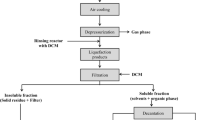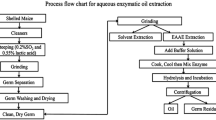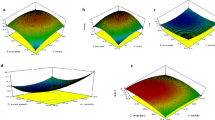Abstract
Enzymatic methanolysis of refined soybean oil with methanol was investigated using Rhizomucor miehei lipase, Lipozyme RM IM, in n-hexane for reaction times of 30 min. Response surface methodology (RSM) based on three-level, three-factor (variable) face-centered cube design was used for the optimization of methanolysis. The independent variables that affect the methanolysis reaction conducted in n-hexane are temperature (°C), enzyme/oil weight ratio, and oil/methanol molar ratio. A good quadratic model was obtained for the methyl ester production by multiple regression and backward elimination. A linear relationship was observed between the observed and predicted values (R2−0.9635). The effects of temperature and enzyme amount, which affected methyl ester content of the product (response) positively, were significant (P<0.01). The quadratic term of temperature and the interaction term of enzyme amount with temperature affected the response negatively (P<0.01). The interaction term of enzyme amount with substrate mole ratio had a positive effect on the response (P<0.05). Critical conditions for the response at which methyl ester content of the product was 76.9% were determined to be 50°C, 2.37 methanol/oil mole ratio, and 0.09 enzyme/oil weight ratio.
Similar content being viewed by others
References
Nelson, L.A., T.A. Foglia, and W.N. Marmer, Lipase-Catalyzed Production of Biodiesel, J. Am. Oil Chem. Soc., 73:1191–1195 (1996).
Shieh, C.J., H.F. Liao, and C.C. Lee Optimization of Lipase-Catalyzed Biodiesel by Response Surface Methodology, Bioresource Technol. 88:103–106 (2003).
Fukuda, H., A. Kondo, and H. Noda, Biodiesel Fuel Production by Transesterification of Oils, J. Biosci. Bioeng. 92:405–416 (2001).
Soumanou, M.M., and U.T. Bornscheuer, Improvement in Lipase-Catalyzed Synthesis of Fatty Acid Methyl Esters from Sunflower Oil, Enzyme Microb. Technol. 33:97–103 (2003).
Köse, Ö., M. Tüter, and H.A. Aksoy, Immobilized Candida antarctica Lipase-Catalyzed Alcoholysis of Cotton Seed Oil in a Solvent-Free Medium, Bioresource Technol. 83:125–129 (2002).
Watanabe, Y., Y. Shimada, A. Sugihara, and Y. Tominaga, Conversion of Degummed Soybean Oil to Biodiesel Fuel with Immobilized Candida antarctica Lipase, J. Mol. Catal. B. Enzym. 17:151–155 (2002).
Du, W., Y. Xu, and D. Liu, Lipase-Catalysed Transesterification of Soya Bean Oil for Biodiesel Production During Continuous Batch Operation, Biotechnol. Appl. Biochem. 38:103–106 (2003).
Noureddini, H., X. Gao, and R.S. Philkana, Immobilized Pseudomonas cepacia Lipase for Biodiesel Fuel Production from Soybean Oil, Bioresource Technol 96:769–777 (2005).
Deng, L., T. Tan, F. Wang, and X. Xu, Enzymatic Production of Fatty Acid Alkyl Esters with a Lipase Preparation from Candida sp. 99–125, Eur. J. Lipid Sci. Technol. 105:727–734 (2003).
Chang H.M., H.F. Liao, C.C. Lee, and C.J. Shieh, Optimized Synthesis of Lipase-Catalyzed Biodiesel by Novozym 435, J. Chem. Technol. Biotechnol. 80:307–312 (2005).
Virto, M.D., J.M. Lascaray, R. Solozabal, and M. de Renobales, Enzymic Hydrolysis of Animal Fats in Organic Solvents at Temperatures Below Their Melting Points, J. Am. Oil Chem. Soc. 68:324–327 (1991).
Senanayake, S.P.J.N, and F. Shahidi, Lipase-Catalyzed Incorporation of Docosahexaenoic Acid (DHA) into Borage Oil: Optimization Using Response Surface Methodology, Food Chem. 77:115–123 (2002).
Author information
Authors and Affiliations
Corresponding author
About this article
Cite this article
Demirkol, S., Aksoy, H.A., Tüter, M. et al. Optimization of enzymatic methanolysis of soybean oil by response surface methodology. J Amer Oil Chem Soc 83, 929–932 (2006). https://doi.org/10.1007/s11746-006-5048-4
Received:
Accepted:
Issue Date:
DOI: https://doi.org/10.1007/s11746-006-5048-4




